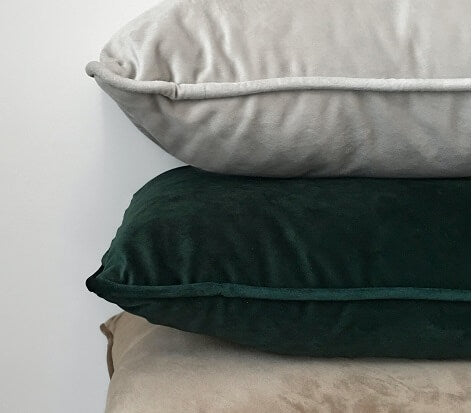Are you someone who struggles with getting a good night's sleep? Do you often wake up with neck pain or stiffness? If yes, you might have considered using a shaped pillow. But do these pillows really help you sleep better and how long do pillows last?
In this blog post, we will delve into what shaped pillows are, explore the different pillow shapes, the benefits they promise, the science behind their use, and whether they genuinely improve sleep quality.

What are Shaped Pillows?
Venturing away from the traditional fluffy rectangle, we enter the world of shaped pillows. These innovative cushions are masterfully crafted to mold to the unique contours of your body, primarily focusing on your neck and head. They are a diverse breed, coming in a variety of designs from U-shaped to V-shaped, cylindrical, and beyond. What sets them apart is their specificity – some shaped pillows are even custom-designed to target particular sleep concerns, such as sleep apnea or neck pain. For instance, shaped pillows for neck support are designed to maintain proper alignment and reduce strain during rest. It's like having a pillow that is tailored just for you, considering your specific needs and challenges. Imagine a pillow that is not just a resting place for your head, but a tool to improve your sleep quality and health. That's the intriguing world of shaped pillows for you!
The Claimed Benefits of Shaped Pillows
What's the buzz around shaped pillows? They offer a range of benefits designed to provide a comfortable and restorative night’s sleep. Their standout feature is their ability to significantly enhance sleep quality, especially for specific needs like those of side sleepers with neck pain. Unlike standard pillows, shaped pillows are crafted to deliver optimal support for your neck and spine, a crucial aspect often overlooked by traditional designs. By promoting proper alignment, these pillows can help address common sleep issues such as snoring, insomnia, and sleep apnea.
For side sleepers with neck pain, these pillows are particularly effective, as they fill the gap between the neck and mattress, alleviating pressure and reducing discomfort. Beyond that, they can help ease neck and back aches, prevent migraines, and even provide relief from conditions like acid reflux. With such an impressive list of benefits, it’s no wonder shaped pillows are gaining popularity in the world of sleep hygiene. But before you make the switch, let’s explore the science behind shaped pillows and how they can improve sleep quality for side sleepers and beyond.
The Science Behind Shaped Pillows and Sleep
Ever wondered how shaped pillows enhance your slumber? It's all about the magic of spinal alignment. These smartly-designed cushions aim to perfectly support your neck and head, thus maintaining a neutral spine position throughout your sleep. Why does this matter? Picture a string of dominoes, standing upright in a perfect line. Now, imagine if one domino is out of alignment - the entire line could topple! Similarly, if your spine is out of alignment during sleep, it can disrupt your sleep quality and lead to discomfort or pain.
Research points to a host of benefits that come with keeping your spine in alignment as you rest. For starters, it could lead to a significant improvement in your sleep quality, making your nights more restful and your days more energetic. Additionally, aligning your spine can help reduce musculoskeletal pain, providing relief from those persistent aches that wake you up at night. Many sleepers find that shaped pillows for support are especially effective in maintaining this alignment and preventing discomfort.
But the benefits of spinal alignment don't end there! Snoring and sleep apnea, two common disruptors of peaceful sleep, could also be kept at bay with the use of shaped pillows. By ensuring a neutral spine position, these pillows can open up your airways, making breathing easier, and reducing the chances of these conditions interrupting your sleep. So, shaped pillows aren't just about comfort, they're about optimizing your body's natural processes to help you achieve a restful night's sleep.

Considerations When Choosing a Shaped Pillow
Excited about the prospects of a shaped pillow? Great! However, let's pump the brakes a little and consider some crucial aspects before diving headfirst into your purchase. First off, identify your sleep position. Are you a side sleeper? A back sleeper? Or perhaps a stomach sleeper? Each position calls for different support levels. Side sleepers, for instance, often need a firmer pillow for adequate neck support, while stomach sleepers may benefit from a softer one. Choosing a pillow that doesn't align with your sleeping style might not only fail to improve your sleep but could potentially make things worse.
Next, let's talk materials. Memory foam, latex, gel, or down - each offers a unique feel and level of support. For example, the benefits of memory foam pillows are great for contouring to your body shape, providing excellent support. However, they may retain heat, making them less suitable for those who tend to overheat during sleep.
And then there's the question of firmness. Some people swear by hard pillows, while others can't sleep without the soft fluffiness under their heads. Be sure to take your comfort preferences into account.
Last but not least, remember that size matters! Your pillow should be large enough to comfortably accommodate your head without leaving your neck unsupported.
Finally, bear in mind that shaped pillows, with their specialized design and materials, tend to be pricier than their standard counterparts. So, before investing, ensure that the pillow you choose aligns not just with your body, but also your budget!
The Importance of Personal Experience
Let's take a moment to stress the role of individual experiences in this shaped pillow journey. While scientific data and claims can point you in a certain direction, it's your personal experience that holds the real power. Remember, we're all unique with our sleep habits, preferences, and physical requirements. Thus, a shaped pillow that works wonders for someone else may not do the same for you.
Taking a shaped pillow for a test snooze is a wise move. Give it a few weeks, allowing your body to adapt and respond to this new sleep companion. During this period, monitor any changes in your sleep pattern and comfort levels. Are you tossing and turning less? Do you wake up feeling more rejuvenated and less groggy? What about your neck or back pain – any noticeable improvements there? For those who prefer resting on their side, shaped pillows for side sleepers can make a significant difference by providing targeted support and alignment.
But remember, you're not just looking for positive changes. Pay attention to any adverse effects too. Are you waking up with stiffness or soreness you didn't have before? Are you having trouble falling asleep because of discomfort? These could be signs that the pillow isn't right for you, despite its promising features and benefits.
In essence, let your personal experience guide you in determining if a shaped pillow is your ticket to better sleep. This isn't about jumping on the bandwagon, but about finding what truly works for you. For many, shaped pillows for sleep provide the right balance of comfort and support, making them a valuable addition to a healthier bedtime routine.
The Bottom Line: Do Shaped Pillows Help You Sleep Better?
In the realm of sleep comfort, shaped pillows have emerged as game-changers. Their promises are as varied as their designs—ranging from enhancing sleep quality to easing neck and back discomfort to curbing snoring. These claims are grounded in science, with spinal alignment and support at their core. For those wondering how to sleep when someone is snoring, shaped pillows may offer a practical solution by promoting better head and neck positioning, which can reduce noise disturbances. However, their effectiveness is not a universal truth. Shaped pillows may be the answer to the sleep prayers of some, while for others, they may not hold the same charm. Your sleep position, comfort preferences, and physical needs are crucial determinants in their success. So, while shaped pillows are capable of delivering improved sleep for many, they are not a one-size-fits-all remedy. It's pivotal to examine your individual requirements and comfort before opting for this modern sleep solution.






